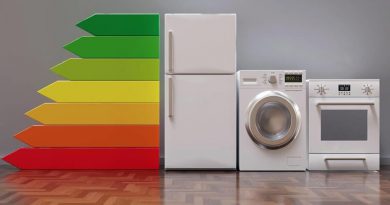What are the environmental impacts associated with the use of household appliances and how can they be reduced?
Everyday life is made more convenient and efficient by the use of household appliances. From refrigerators to washing machines, these devices have become essential in our modern homes. However, it’s important to be aware of the environmental implications associated with their usage. In this article, we will explore the environmental effects of household appliances and discuss practical ways to minimize their impact, allowing us to enjoy the benefits of these devices while promoting sustainability.
The Energy Consumption Challenge
One of the primary environmental concerns related to household appliances is their energy consumption. Many appliances rely on electricity, which is predominantly generated through non-renewable resources such as coal or natural gas. The increased demand for energy contributes to carbon dioxide emissions, air pollution, and the depletion of natural resources.
However, advancements in technology have led to the development of energy-efficient appliances that consume less power while maintaining optimal functionality. When purchasing new appliances, look for the ENERGY STAR label or similar certifications, as these indicate higher energy efficiency and reduced environmental impact.
Water Usage and Conservation
Water consumption is another significant environmental aspect of household appliances, particularly in the case of washing machines and dishwashers. These appliances require substantial amounts of water to operate effectively. Conserving water is crucial for both environmental sustainability and the responsible management of this valuable resource.
To minimize water usage, consider using the appropriate load settings for your appliances and avoiding unnecessary cycles. Additionally, repairing leaks promptly and opting for water-saving features in newer models can contribute to significant water conservation efforts.
Material Selection and Recycling
The materials used in the manufacturing of household appliances can also have environmental implications. Some appliances contain hazardous substances, such as mercury or lead, which can be harmful if not properly disposed of. Additionally, the extraction and processing of raw materials for appliance production can result in environmental degradation.
To address these concerns, manufacturers are increasingly adopting eco-friendly practices, including the use of recyclable materials and the implementation of responsible recycling programs. As consumers, we can support these efforts by properly recycling or disposing of old appliances, following local regulations and guidelines.
Longevity and Maintenance
Extending the lifespan of household appliances is an effective way to reduce their overall environmental impact. Regular maintenance, such as cleaning filters, defrosting, and ensuring proper ventilation, can enhance the efficiency and performance of appliances, ultimately reducing energy consumption.
Investing in high-quality appliances and prioritizing repair over replacement whenever possible also contributes to sustainability. By extending the useful life of our appliances, we minimize the need for new manufacturing processes, conserve resources, and reduce waste.
Conclusion
Understanding the environmental effects of household appliances empowers us to make conscious choices that promote sustainability. Through energy-efficient practices, water conservation, responsible material selection, and maintenance, we can significantly reduce the environmental impact associated with our appliance usage.
Remember, each small step contributes to a collective effort in preserving the planet for future generations. By embracing environmentally conscious habits and supporting eco-friendly initiatives, we can enjoy the benefits of household appliances while minimizing their ecological footprint. Together, let’s create a more sustainable and environmentally friendly future.




